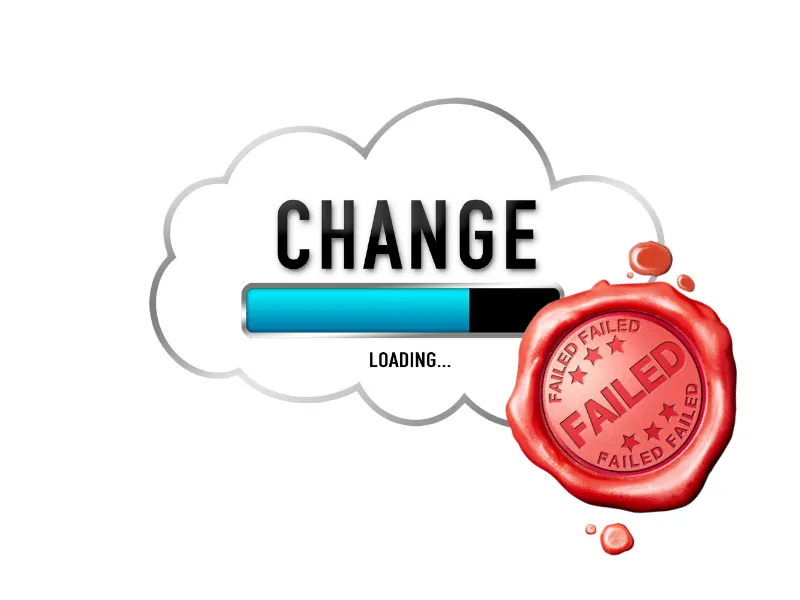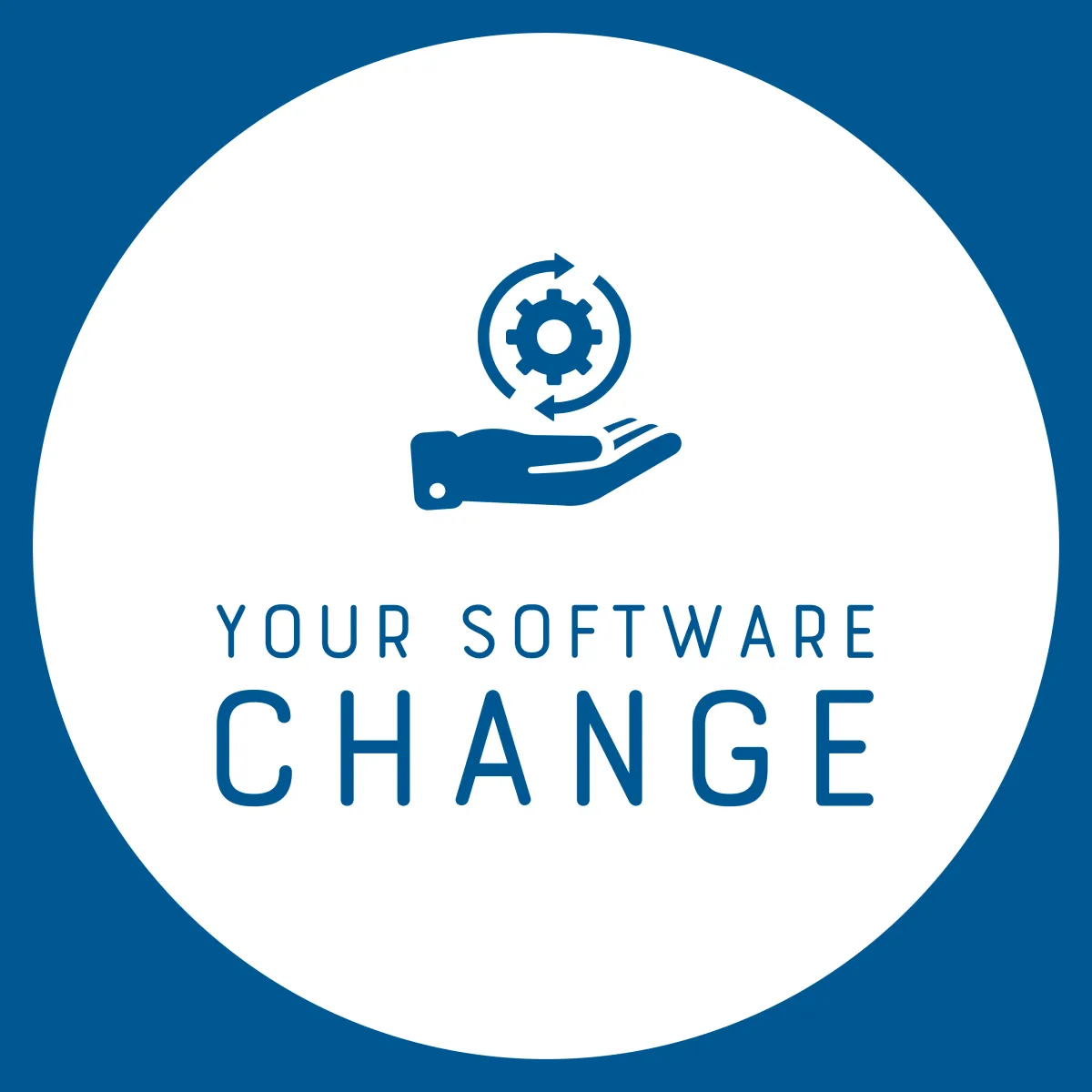Unlock the full potential of your
software investment....
Your Software Change Blog....

When Change Management Doesn't Work
“A good intention, with a bad approach, often leads to a poor result" (Thomas Edison)
When Change Management Doesn't Work
Change Management is still a relatively new field and only just reaching the consciousness of the many, and it unfortunately still has a long way to go in convincing the masses in it’s immense value and benefits.
The other big issue when something starts to get popular and talked about as an essential part of a project people try to find cheap and quick solutions.
So lets look when at when Change Management won’t work:
1. “Change Management is just a few emails and training innit?”

How many people who hear change management, read a few paragraphs if we are lucky, and decide that Change Management is just a few emails and training.
Yes Communication is a vital part of any successful project and many projects appoint separate communication leads to run the project communication.
A good solid communication plan helps with consistency of message throughout the project, keeps awareness up, maintains the key message but switches the language and content depending on the audience, all of which keeps the business informed, aware and helps build readiness for the change the project is implementing.
But that is not all there is to Change Management – Change Management is about 2-way communication, it is about engagement early on with the people affected by the project, it is about listening to their thoughts, their lived experience, what their thoughts are, how can the project be improved, what will and won’t work when it goes live, what could be done differently.
AND then taking that back to the project and assessing the project and plans against that feedback. Do we need to change anything, do we need to think differently about something, will our solution still be delivering what we set out to achieve.
Sometimes the feedback is just noise, sometimes the feedback can be the most wonderful gift to the project and provide solutions or adjustments that would have been missed that are fundamental to the success of the project.
Change Management is also not a once and done thing, so don’t just have those 2 way feedback sessions at the beginning and the end of the project you should be having them throughout the project, making sure we aren’t steering off course – especially as so many major projects are 3 – 4 years in the making.
Change Management can also help with the noise, so the feedback that comes from the disgruntled employees, lets help them feel heard, lets explain why XYZ is happening and ABC can’t happen, let’s try and nip the doom and gloom and end is nigh gossip in the bud, with both structured and informal opportunitites where concerns and frustrations can be heard, ensuring all affected parties feel listened to and like their suggestions will be considered even if not implemented.
Oh and Training – I started my career as a trainer – I will fight tooth and nail for a good learning and adoption plan on any project but thinking you can shove a change manager in at the end of a project, plan and deliver some training, polish a turd and deem the project a success – purlease (I’m so not the sort of person who says that sort of thing in real life but it fits here so perfectly)!
2. Change Management as the magic bullet / tick box exercise
Oh Change Management is the answer, lets get a Change Manager and everything will magically be perfect, with a Change Manager when we say jump all of our employees will ask “how high”.

So we appoint a Change Manager and suddenly they’re asking questions, no no no your job is to just make the business like what we are doing.
Maybe the Change Manager has the audacity to speak with the business and get their feedback and wants to discuss their suggestions and feasibility, no no no, we have a plan, we are sticking to the plan, we can not deviate, as Change Manager your job is to change the people not the project.

I think you can see where I am going with this, appointing a Change Manager and expecting the project to magically be a success without giving the Change Manager any remit/authority to influence the outcome of the project does not mean you have done Change Management.
You will hopefully do better than having zero change management activities as hopefully you will have a clear communication plan, messaging, stakeholder engagement etc but if you are unwilling to listen, amend, adjust based on the amazing knowledge within your organisation, then you are not optimising your project and you are purely using your Change Manager as a scape goat and tick box exercise, oh the business doesn’t like it, oh the business won’t use it, well it must be the Change Managers fault because making the business like it was their job no matter how bad a solution we delivered.
3. Change Management tagged onto other roles
This is a bit of a difficult one for me, because I have experience and qualifications as both a Project Manager and a Change Manager, and even before I knew Change Management was a “thing” I was doing Change Management activities instinctively.
So I am not saying it can’t be done, just that it depends on the person and the underlying motive behind creating such a role.
Is it something they’re tagging on because they’ve been told they need Change Management and see it as a tick box exercise, or just someone to send a few emails on top of their normal role.
Or is it a smaller project/organisation and they are hoping for a Generalist who can do both together.

Project Managers are essential, especially in technical projects, they have a complex matrix of different teams, different tasks, that all have inter-dependencies, which they need to keep on track, everything working in perfect time, on budget and not have any issues that will cause knock on and snowball effect delays to the project.
Change Managers facilitate the change, they ensure the business is ready for the change and that the solution being delivered is fit for the business, now ideally they have been involved from the beginning and as such the solution is designed for the business, and they can work well with the project manager.
But what if something has been discovered mid way through the project and the solution being delivered is no longer fit for purpose and needs a rethink. Who takes the precedence then – the PM who has their targets and deadlines and success or the change manager who wants a solution that works for the business.
The right person will quickly get you the costs and benefits (all costs not just financial) of several options so the organisation can make a informed decision of how to proceed.
However, you may get someone who is a Project Manager and thinks Change Management is just some emails and tick box exercises, or some one who is a Change Manager and thinks Project Management is just following a project plan and you can just shift a few things around and it will all magically fall into place.
And this is when you need to be careful….because they will probably make a decision based on their own bias and experience and that means you as senior stakeholders and sponsors won’t get that chance to make key decisions that affect the business.
I predominantly see advertised Project Manager with some Change Management activities tied in, which is why I have focused on these two, and at least if these are combined Change Management is part of the project throughout the whole project cycle. (I personally believe Change Management should be involved from inception of an idea long before the Project Manager is brought in – but that is worthy of its own blog post all on it’s own).
My real worry is if it starts being tagged onto other roles, training for instance, yes Change Management and Training should work really closely, but if you are bringing in Change Management at the point of the project you are bringing in Training you are way too late.
I don’t think I have seen Change Management with Business Analyst but with the right person I can see this potentially working, like with the project manager combination I think it depends on the motive of the organisation for merging the two roles and the person appointed.
4. Change Management as a junior position
This is similar to the points described above, only you believe you are doing everything right, you believe in Change Management, you understand the benefits, you have allotted budget and resource, everything is going to go swimmingly.
However a Change Manager with no authority or remit is a Change Manager with their hands tied behind their backs.

You need a Change Manager who can speak up for the business in project meetings, who can have a voice at the table, who can at least ensure feedback and suggestions are considered, who has authority to say wait, this is a major issue for the business if we continue down the route we are going, we need to stop assess and give some options so the business can make an informed decision.
If your Change Manager is a junior member of the project they may have a slot in the project meetings to share their findings, but if they are ignored, there isn’t much they can do, especially as they are probably working for the project manager, how can you argue with your boss if you genuinely believe a decision is the wrong decision for the business?
Also a junior Change Manager will not be able to have the required influence within the business either.
In most organisations there is always that one Manager, Director, Member of the Senior Leadership Team who hates change, or sees the project as a direct attack on them and their team, who believes that any updates are a waste of time etc etc
You send in a junior change manager to engage with this Stakeholder – what do you think will happen? Will they listen, or will they rail road, will they be open to discussing compromises and other solutions, or will they dig their heels in more?
You need a Change Manager who is a senior member of the Project Team and can speak in authority, who can converse and discuss on a equal footing.
They don’t need to be SLT or even a Director but they need some authority and ownership to be able to have influence and open discussions, while ensuring the success of the project is front and centre of all discussions and decisions.
What have I missed?
Let me know what have I missed?
When have you been involved in a project and there were missed opportunities which could have been mitigated with proper Change Management?
The more we start openly talking about these and discussing why there were challenges and potential solutions that could have mitigated the issues, the more we open people's mind to the full extent of the power of Change Management in the long lasting success of any project and help to stop the "we tried that once, it didn't work, so proves my belief that it is just nicey nice 'fluff' and unneccesary"
Copyright: Optimise Your Software Ltd


